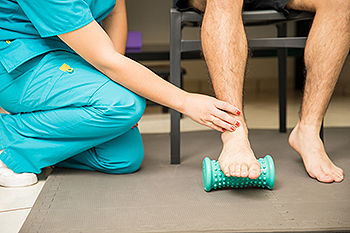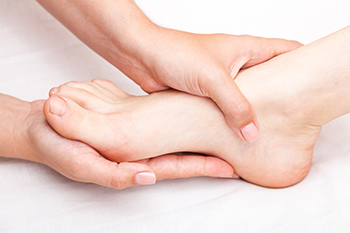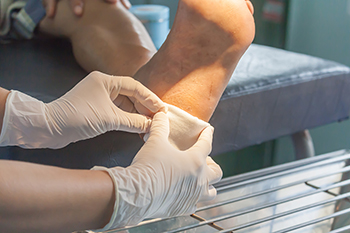Connect With Us
Blog
Stretches May Help to Relieve Heel Pain from Plantar Fasciitis

A symptom of the foot condition that is known as plantar fasciitis is severe heel pain, and it can make daily activities difficult to complete. The plantar fascia is found on the sole of the foot, and it connects the heel to the toes. Many people have found the benefits of practicing specific foot stretches to help ease heel pain. A towel stretch is an effective exercise for the bottom of the foot. This is done by sitting on the floor, and wrapping a towel around the sole of the foot, and gently flexing the foot towards the face. Some patients find it helpful to practice heel stretches. This is accomplished by standing on a step, and lowering the heels one at a time, until a mild stretch is felt. There are many exercises that can specifically help plantar fasciitis. If you would like more information about this, it is suggested that you confer with a podiatrist who can effectively guide you.
Plantar fasciitis is a common foot condition that is often caused by a strain injury. If you are experiencing heel pain or symptoms of plantar fasciitis, contact one of our podiatrists from Foot & Ankle Associates of Maine. Our doctors can provide the care you need to keep you pain-free and on your feet.
What Is Plantar Fasciitis?
Plantar fasciitis is one of the most common causes of heel pain. The plantar fascia is a ligament that connects your heel to the front of your foot. When this ligament becomes inflamed, plantar fasciitis is the result. If you have plantar fasciitis you will have a stabbing pain that usually occurs with your first steps in the morning. As the day progresses and you walk around more, this pain will start to disappear, but it will return after long periods of standing or sitting.
What Causes Plantar Fasciitis?
- Excessive running
- Having high arches in your feet
- Other foot issues such as flat feet
- Pregnancy (due to the sudden weight gain)
- Being on your feet very often
There are some risk factors that may make you more likely to develop plantar fasciitis compared to others. The condition most commonly affects adults between the ages of 40 and 60. It also tends to affect people who are obese because the extra pounds result in extra stress being placed on the plantar fascia.
Prevention
- Take good care of your feet – Wear shoes that have good arch support and heel cushioning.
- Maintain a healthy weight
- If you are a runner, alternate running with other sports that won’t cause heel pain
There are a variety of treatment options available for plantar fasciitis along with the pain that accompanies it. Additionally, physical therapy is a very important component in the treatment process. It is important that you meet with your podiatrist to determine which treatment option is best for you.
If you have any questions, please feel free to contact our office located in Brunswick, ME . We offer the newest diagnostic and treatment technologies for all your foot care needs.
See Your Foot Specialist Regularly If You Work On Your Feet
Pain Across the Top of the Foot

Tendonitis, or inflammation of a tendon, is common among runners as well as others who do a lot of running during sports activities. A particular brand of tendonitis that occurs across the top of the foot is typical of overuse. It is known as extensor tendonitis, and affects the three tendons that connect the leg bones to the bones in the feet that allow you to walk and run. Symptoms include aching pain that worsens through activity. Some swelling may occur, and curling the toes usually adds to the pain as the tendons are stretched. Besides overuse, other factors to address include your footwear and training regime. Running shoes that fit poorly and are tied too tightly contribute to the pressure on the top of the foot. Also, changing your training program to include running up and down hills can negatively affect the extensor tendons. The first action to take against extensor tendonitis is to stop the activity. For other treatment options, it is wise to see a podiatrist who will be able to evaluate the severity of your condition and provide the appropriate solutions.
Foot Pain
Foot pain can be extremely painful and debilitating. If you have a foot pain, consult with one of our podiatrists from Foot & Ankle Associates of Maine. Our doctors will assess your condition and provide you with quality foot and ankle treatment.
Causes
Foot pain is a very broad condition that could be caused by one or more ailments. The most common include:
- Bunions
- Hammertoes
- Plantar Fasciitis
- Bone Spurs
- Corns
- Tarsal Tunnel Syndrome
- Ingrown Toenails
- Arthritis (such as Gout, Rheumatoid, and Osteoarthritis)
- Flat Feet
- Injury (from stress fractures, broken toe, foot, ankle, Achilles tendon ruptures, and sprains)
- And more
Diagnosis
To figure out the cause of foot pain, podiatrists utilize several different methods. This can range from simple visual inspections and sensation tests to X-rays and MRI scans. Prior medical history, family medical history, and any recent physical traumatic events will all be taken into consideration for a proper diagnosis.
Treatment
Treatment depends upon the cause of the foot pain. Whether it is resting, staying off the foot, or having surgery; podiatrists have a number of treatment options available for foot pain.
If you have any questions, please feel free to contact our office located in Brunswick, ME . We offer the newest diagnostic and treatment technologies for all your foot care needs.
The Senior Population and Foot Wounds

Wounds on the feet can be a common occurrence for much of the population, and they can be a serious concern among the elderly. This can be a result of diminished blood flow in the feet and immediate medical attention may help to avoid potential problems. Effective wound prevention can include moisturizing the feet and drinking plenty of fresh water daily. Additionally, it may help to take a multivitamin that is designed to protect the skin. The skin color may turn when a wound is present, and a clean environment is needed for successful wound healing. This is followed by using a non-adherent dressing and placing a cushioned bandage over the wound. A pressure ulcer is a common type of wound that elderly people may develop. This often happens as a result of pressure that occurs over a bone. If you would like more information about types of foot wounds and how to treat them, it is strongly suggested that you confer with a podiatrist.
Wound care is an important part in dealing with diabetes. If you have diabetes and a foot wound or would like more information about wound care for diabetics, consult with one of our podiatrists from Foot & Ankle Associates of Maine. Our doctors will assess your condition and provide you with quality foot and ankle treatment.
What Is Wound Care?
Wound care is the practice of taking proper care of a wound. This can range from the smallest to the largest of wounds. While everyone can benefit from proper wound care, it is much more important for diabetics. Diabetics often suffer from poor blood circulation which causes wounds to heal much slower than they would in a non-diabetic.
What Is the Importance of Wound Care?
While it may not seem apparent with small ulcers on the foot, for diabetics, any size ulcer can become infected. Diabetics often also suffer from neuropathy, or nerve loss. This means they might not even feel when they have an ulcer on their foot. If the wound becomes severely infected, amputation may be necessary. Therefore, it is of the upmost importance to properly care for any and all foot wounds.
How to Care for Wounds
The best way to care for foot wounds is to prevent them. For diabetics, this means daily inspections of the feet for any signs of abnormalities or ulcers. It is also recommended to see a podiatrist several times a year for a foot inspection. If you do have an ulcer, run the wound under water to clear dirt from the wound; then apply antibiotic ointment to the wound and cover with a bandage. Bandages should be changed daily and keeping pressure off the wound is smart. It is advised to see a podiatrist, who can keep an eye on it.
If you have any questions, please feel free to contact our office located in Brunswick, ME . We offer the newest diagnostic and treatment technologies for all your foot care needs.

